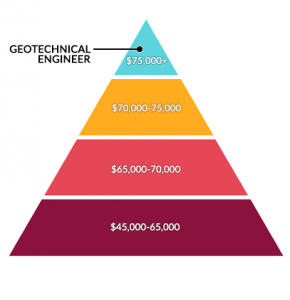The Ultimate Guide To Geotheta
The Ultimate Guide To Geotheta
Blog Article
Facts About Geotheta Revealed
Table of ContentsGetting My Geotheta To WorkGetting The Geotheta To WorkSee This Report about GeothetaGeotheta Fundamentals ExplainedThe Geotheta Diaries

They conduct site examinations, gather examples, carry out research laboratory tests, and examine data to review the viability of the ground for building tasks - Geotechnical Engineers. Based on their searchings for, geotechnical designers provide recommendations for structure design, slope security, keeping structures, and reduction of geotechnical dangers. They collaborate with other specialists, such as engineers, structural designers, and building groups, to make certain that geotechnical factors to consider are incorporated right into the general job design and implementation
By analyzing the habits and residential properties of dirt and rock, they can determine potential geotechnical threats such as landslides, soil settlement, or incline instability. Their competence aids protect against failures or mishaps that can jeopardize lives and building. Right here are some comprehensive duties and duties of a geotechnical designer: Website Examination: Geotechnical designers conduct website investigations to collect data on subsurface problems.
They interpret the data to recognize the properties and behavior of the dirt and rock, including their strength, leaks in the structure, compaction qualities, and groundwater conditions. Geotechnical Analysis and Design: Geotechnical engineers evaluate the data collected throughout site investigations to evaluate the stability and suitability of the website for construction projects. They carry out geotechnical computations and modeling to assess factors such as birthing ability, negotiation, incline security, side planet pressures, and groundwater circulation.
Geotheta Things To Know Before You Buy
Structure Style: Geotechnical designers play a critical function in designing structures that can safely sustain the designated structure. They examine the dirt problems and tons demands to establish the appropriate foundation kind, such as shallow foundations (e.g., footings), deep structures (e.g (https://www.tumblr.com/geotheta/757702666915840000/geotheta-has-grown-exponentially-since?source=share)., piles), or specialized techniques like soil enhancement. They take into consideration aspects such as negotiation limitations, bearing capacity, and soil-structure communication to establish optimal foundation designs
They evaluate building and construction strategies, monitor site tasks, and conduct field evaluations to verify that the layout suggestions are followed. If unforeseen geotechnical issues emerge, they analyze the situation and provide suggestions for remediation or adjustments to the layout. Danger Analysis and Reduction: Geotechnical designers evaluate geotechnical dangers and threats connected with the project site, such as landslides, liquefaction, or dirt disintegration.

Cooperation and Interaction: Geotechnical designers work carefully with various other professionals entailed in a job, such as engineers, architectural engineers, and construction teams. Effective communication and collaboration are important to integrate geotechnical considerations right into the overall job layout and building and construction procedure. Geotechnical engineers give technical competence, response inquiries, and make sure that geotechnical requirements are met.
Not known Factual Statements About Geotheta
Here are some sorts of geotechnical engineers: Foundation Designer: Structure engineers specialize in developing and examining foundations for frameworks. They examine the dirt problems, tons demands, and site attributes to figure out one of the pop over to these guys most appropriate foundation kind and style, such as shallow foundations, deep foundations, or specialized methods like pile foundations.
They review the variables affecting slope security, such as soil residential properties, groundwater problems, and incline geometry, and create strategies to avoid incline failures and reduce risks. Earthquake Engineer: Quake designers concentrate on examining and creating structures to stand up to seismic pressures. They assess the seismic risk of a site, review soil liquefaction potential, and create seismic design standards to ensure the security and strength of frameworks during quakes.
They execute field testing, accumulate examples, and analyze the gathered information to define the soil homes, geologic formations, and groundwater conditions at a site. Geotechnical Instrumentation Engineer: Geotechnical instrumentation engineers concentrate on surveillance and measuring the behavior of dirt, rock, and frameworks. They mount and preserve instrumentation systems that monitor elements such as dirt settlement, groundwater degrees, slope activities, and architectural displacements to assess efficiency and offer very early cautions of potential problems.
How Geotheta can Save You Time, Stress, and Money.
They conduct tests such as triaxial tests, consolidation examinations, straight shear tests, and leaks in the structure examinations to gather data for geotechnical evaluation and style. Geosynthetics Engineer: Geosynthetics designers specialize in the style and application of geosynthetic materials, such as geotextiles, geogrids, and geomembranes. They make use of these products to boost dirt security, strengthen slopes, give drain solutions, and control erosion.
They tend to be investigative people, which suggests they're intellectual, reflective, and inquisitive. They are interested, systematic, logical, logical, and rational. A few of them are additionally social, suggesting they're kind, charitable, cooperative, patient, caring, helpful, compassionate, skillful, and pleasant. Does this seem like you? Take our free occupation test to figure out if geotechnical designer is just one of your top career suits.
In the workplace environment, geotechnical designers make use of specialized software devices to perform calculations, develop styles, and evaluate information. They prepare reports, review project specs, communicate with clients and staff member, and coordinate project activities. The office setup supplies a helpful setting for research study, analysis, and collaboration with various other specialists associated with the job.
How Geotheta can Save You Time, Stress, and Money.
They frequently see job sites to perform site investigations, assess geotechnical problems, and gather information for evaluation. These sees involve traveling to various locations, occasionally in remote or challenging surfaces. Geotechnical designers may do dirt tasting, conduct examinations, and screen building and construction activities to ensure that the geotechnical elements of the job are being applied correctly.
Geotechnical engineers additionally operate in specialized geotechnical laboratories. In these centers, they carry out experiments, perform tests on dirt and rock samples, and assess the engineering residential or commercial properties of the products. Geotechnical laboratory designers function thoroughly in these environments, dealing with testing devices, running instruments, and taping data. They team up with various other laboratory personnel to make sure exact and trusted testing outcomes.
Report this page